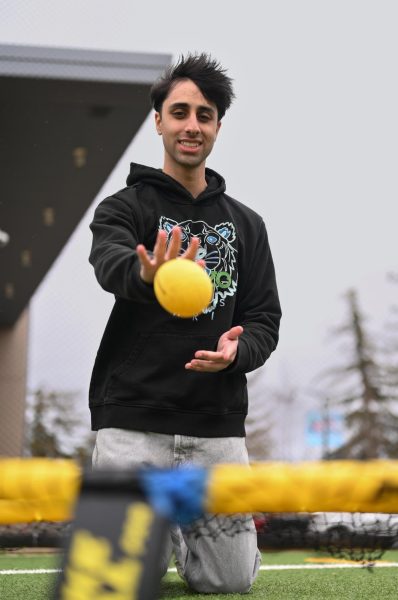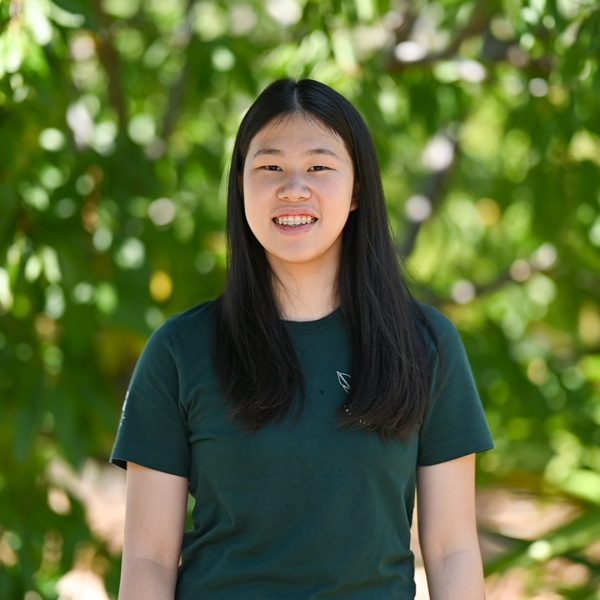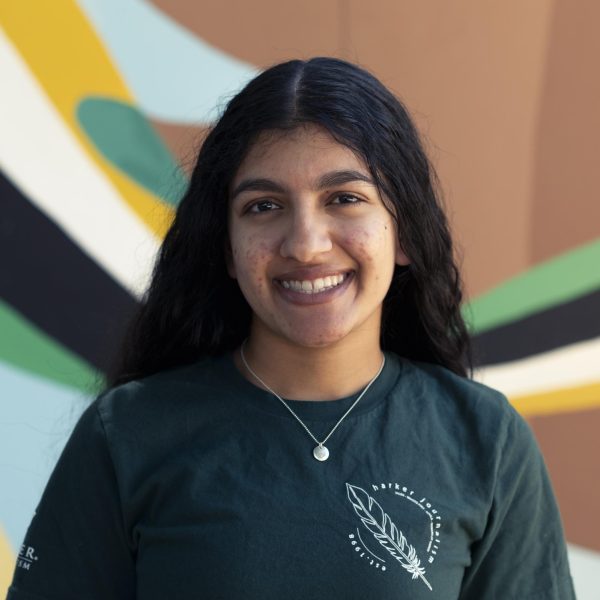
Braving the summer heat, senior Tej Aswani readies himself, aiming for the spikeball net. With a pause for concentration, he sends the yellow ball straight into the center, ricocheting off of the net as his friends cheer. Another player’s hand bounces it right back to him, and the process repeats. By the end of the game, smiles appear on everyone’s faces as they put away the net, ready to dive back into the flow of classes.
In middle school, Tej found interest in minigames, particularly pool and spikeball. After learning the rules from his brother and obtaining a free pool table from a neighbor, he has played consistently throughout high school. In the midst of a busy semester filled with the stress of college decisions and challenging classes, Tej uses pool to destress and maintain concentration.
“As I’ve gotten older, I’ve found that it’s important to learn patience and other qualities that you need later in life, especially for pool,” Tej said. “It’s a game where you need to keep your mind off everything else and focus on how to hit the ball.”
Minigames have also brought Tej closer to his friends and family. Pool has bonded him with his father and brother at home, while spikeball has helped him meet and connect with students at school. As the co-president of Spikeball Club, Tej enjoys the community he has created through spikeball. Although he and his friends treat games as a competition, Tej mainly sees it as a source of entertainment and relaxation.
“There’s so many clubs where you have to do work, but this is a club where you can just come in and play a field game; you don’t even need to be good,” Tej said. “Everyone who’s played in our club has had fun, and it’s a good way to bring the community together.”
As a former sports player, Tej understands how to establish relationships with teammates and classmates alike. Though he mainly played basketball starting in elementary school, he shifted to football in sophomore year and there, with the support of coaches and teammates, found a sense of individuality within his teams.
“Something I learned from football and not another sport is the importance of camaraderie,” Tej said. “I remember a coach once said that it’s a team game, but if everyone executes the one or two jobs they have, then the team can win. If someone messes it up, then it could affect the team as a whole. Even though it’s a team game, you need to play your part. Within your mind, it’s a solo game.”
Tej has also brought a both carefree and persevering attitude into the classroom. History teacher Chuck Witschorik, who taught Tej in junior year, commends him for not only his performance but also his optimism and cooperation with classmates.
“Throughout the class I saw his level of enthusiasm and the great energy that he brought — the positive spirit,” Dr. Witschorik said. “Tej is somebody who picked up everybody else’s spirits and helped us feel good about what we were doing. He showed respect to me as a teacher and to his class, had a positive attitude, a good work ethic and collaborated well with his team.”
Close friend and former football teammate senior Sahil Varma attests to the closeness of their friendship, commenting on their shared classes and games.
“There’s a wide variety of topics that I can come and talk to him about,” Sahil said. “10 minutes before we could be making jokes about a class we’re in together or fantasy football, but when I bring something personal up, he’s always there when I need to talk.”
To Tej, these games serve as an outlet for the stress of work and a time to prioritize his well-being. By spending time with his community, Tej has developed the mindset that everyone should take a break for themselves by resting or unwinding with friends.
“It’s not how everybody works, but for me, I need a way to gather my thoughts and calibrate myself to go throughout the day,” Tej said. “Minigames are fun rather than a chore. Instead of saying that I have to go to practice after a long day at school, it’s my time to do what I do.”


















![“[Building nerf blasters] became this outlet of creativity for me that hasn't been matched by anything else. The process [of] making a build complete to your desire is such a painstakingly difficult process, but I've had to learn from [the skills needed from] soldering to proper painting. There's so many different options for everything, if you think about it, it exists. The best part is [that] if it doesn't exist, you can build it yourself," Ishaan Parate said.](https://harkeraquila.com/wp-content/uploads/2022/08/DSC_8149-900x604.jpg)




![“When I came into high school, I was ready to be a follower. But DECA was a game changer for me. It helped me overcome my fear of public speaking, and it's played such a major role in who I've become today. To be able to successfully lead a chapter of 150 students, an officer team and be one of the upperclassmen I once really admired is something I'm [really] proud of,” Anvitha Tummala ('21) said.](https://harkeraquila.com/wp-content/uploads/2021/07/Screen-Shot-2021-07-25-at-9.50.05-AM-900x594.png)







![“I think getting up in the morning and having a sense of purpose [is exciting]. I think without a certain amount of drive, life is kind of obsolete and mundane, and I think having that every single day is what makes each day unique and kind of makes life exciting,” Neymika Jain (12) said.](https://harkeraquila.com/wp-content/uploads/2017/06/Screen-Shot-2017-06-03-at-4.54.16-PM.png)








![“My slogan is ‘slow feet, don’t eat, and I’m hungry.’ You need to run fast to get where you are–you aren't going to get those championships if you aren't fast,” Angel Cervantes (12) said. “I want to do well in school on my tests and in track and win championships for my team. I live by that, [and] I can do that anywhere: in the classroom or on the field.”](https://harkeraquila.com/wp-content/uploads/2018/06/DSC5146-900x601.jpg)
![“[Volleyball has] taught me how to fall correctly, and another thing it taught is that you don’t have to be the best at something to be good at it. If you just hit the ball in a smart way, then it still scores points and you’re good at it. You could be a background player and still make a much bigger impact on the team than you would think,” Anya Gert (’20) said.](https://harkeraquila.com/wp-content/uploads/2020/06/AnnaGert_JinTuan_HoHPhotoEdited-600x900.jpeg)

![“I'm not nearly there yet, but [my confidence has] definitely been getting better since I was pretty shy and timid coming into Harker my freshman year. I know that there's a lot of people that are really confident in what they do, and I really admire them. Everyone's so driven and that has really pushed me to kind of try to find my own place in high school and be more confident,” Alyssa Huang (’20) said.](https://harkeraquila.com/wp-content/uploads/2020/06/AlyssaHuang_EmilyChen_HoHPhoto-900x749.jpeg)




